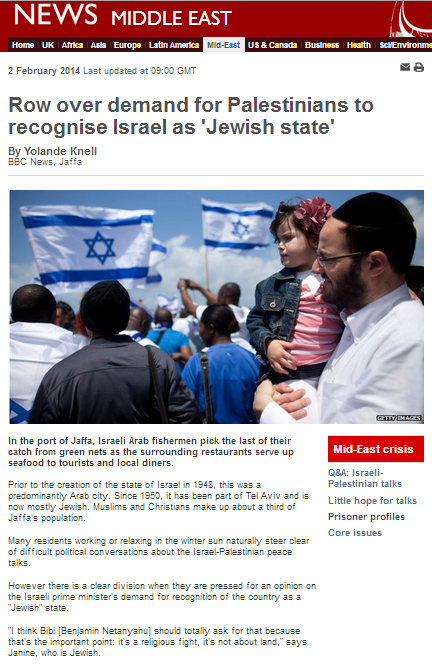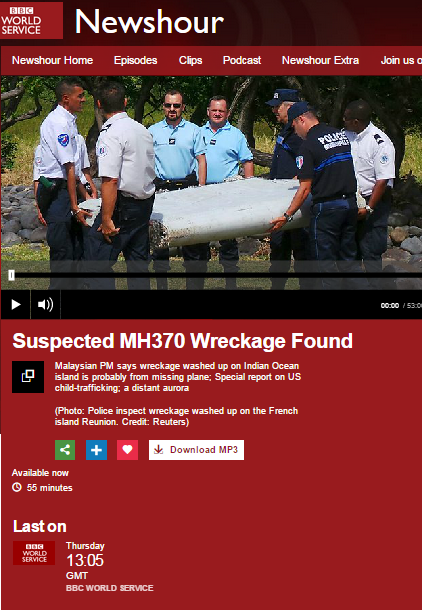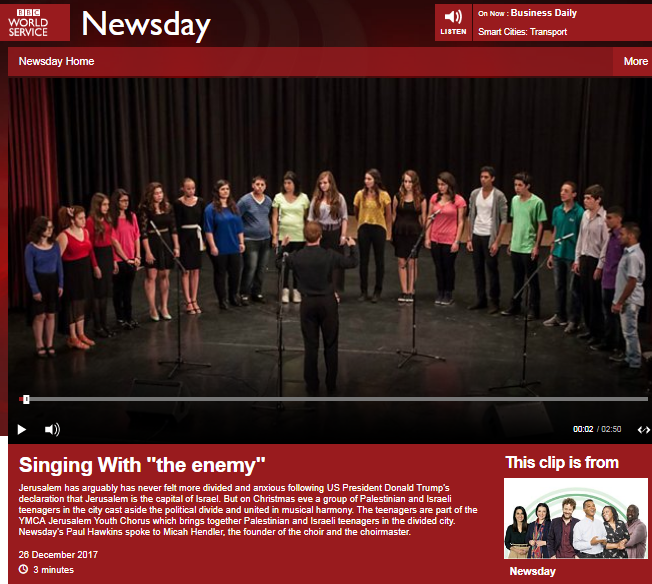On February 2nd an article by Yolande Knell appeared in the ‘Features & Analysis’ section of the BBC News website’s Middle East page under the somewhat bizarre heading “How Jewish is Israel?”.
The link leads to a piece titled “Row over demand for Palestinians to recognise Israel as ‘Jewish state’” in which – at long last – Knell steps a little way out of the frame of the BBC’s hitherto rigid definitions of “core issues” in the Israel/PLO talks and its long touted “obstacles to peace” by addressing the important subject of the recognition of Israel as a Jewish state.
Or does she?
If readers can get past Knell’s romanticized descriptions of Jaffa fishermen and her uncritical repetition of unfounded hearsay according to which “there will be a transfer of the Arab population, we will be sent into exile”, they will find that she actually does little to explain to readers why the recognition of Israel as a Jewish state by the Palestinians is important. 
Knell’s sole reference to the subject of ending future claims comes in the form of a quote from a recent speech given by Israel’s prime minister.
“Mr Netanyahu presented recognition of a Jewish state as an elementary component of true peace.[…]
He suggested that recognition would “end the conflict” as it would mean cancelling the “right of return” for Palestinian refugees and further territorial claims.”
However, she fails to expand on the subject and to explain to audiences exactly what that statement means and its significance as regards securing an agreement which would bring a conclusion to the conflict by ending claims of Israel as ‘Arab’ or ‘Palestinian’ land.
Most notably, throughout the entire article Knell frames the demand for recognition of Israel as a Jewish state as a relatively new one, implying both in her own words and in her choice of quotations that it has been presented by the current Israeli government.
“However there is a clear division when they are pressed for an opinion on the Israeli prime minister’s demand for recognition of the country as a “Jewish” state.”
“Palestinian officials say that the demand for recognition has increasingly been made in recent years and months as an Israeli ploy to make a peace deal harder to reach.”
“Speaking to foreign journalists in Ramallah recently, former negotiator Nabil Shaath complained that the issue was preoccupying Mr Kerry even though it was not included in past talks or any signed documents or agreements between Israel and the Palestinians.”
On that issue, however, Nabil Shaath is mistaken, as shown in an interesting article by Yair Rosenberg from January 21st.
“A new report in Haaretz by Amira Hass–in which she speaks with former Palestinian negotiator Nabil Shaath, who says Netanyahu invented the controversial demand out of whole cloth in 2010–would seem to bolster this claim. The only problem is, it doesn’t stand up to historical scrutiny.” […]
“Hass recounts Shaath’s claim uncritically, leaving readers with the impression that it accords with the historical record. But it does not. In fact, according to the Palestine Papers –a massive trove of leaked documents published by Al Jazeera, which record a decade of Israeli-Palestinian negotiations–the demand was broached by none other than Tzipi Livni…in 2007.” [….]
“Now, Shaath was not in the room for this 2007 negotiating session, so it’s possible he never heard about this incident. (Or the fact that “references must be made to Israel’s right to exist as a Jewish state” was one of Israel’s official reservations appended to the 2003 Bush Road Map.) But the Palestine Papers are in the public domain, and available to any reporters seeking to fact-check whether Netanyahu was the first to ask that the Palestinians recognize Israel as the nation-state of the Jewish people, just as Israel will recognize Palestine as the nation-state of the Palestinian people.”
Clearly either Yolande Knell’s fact checking is in the same league as that of Ha’aretz’s Amira Hass or – with over a third of the word-count of her article devoted to presentation of claims by Mahmoud Abbas and Nabil Shaath and no substantial analysis offered to readers on the relationship between recognition of Israel as a Jewish state and the end of future claims – she deliberately sought to leave readers with a warped impression that, coincidentally or not, dovetails with the Palestinian Authority’s ongoing campaign (which apparently includes a 28-page briefing for journalists) seeking to frame this issue as an attempt by the current Israeli government to scupper talks.
Either way, the repetition of claims by Shaath which were shown to be inaccurate nearly two weeks before Knell’s article was published means that this ‘analysis’ clearly does not meet the professed BBC standards of accuracy and impartiality.
This issue is one which it is important for BBC audiences to understand if they are to be able to reach informed opinions on the subject of the current talks between Israel and the PLO and on the broader issue of the peace process in general. It is therefore disappointing to see that Knell’s short excursion beyond the usual BBC framing of those subjects has been largely squandered on the repetition and amplification of already debunked politically motivated claims.
Related Articles:
BBC continues to avoid essential ‘core issues’ of Middle East talks





